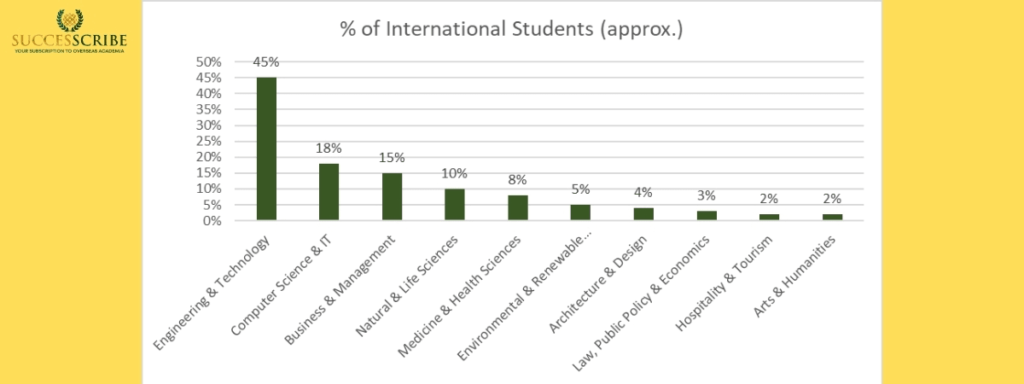Germany is an academic powerhouse globally recognized for offering free or affordable, high-quality education and for producing graduates who drive global progress in engineering, technology, business, and life sciences. For international students, choosing the best courses to study in Germany is paramount to securing academic excellence, global employability, and long-term personal growth. As of 2025, with over 400,000 international students choosing Germany as their study destination, the country’s universities continue to attract talent from across the globe. This surge is no coincidence: Germany’s higher education system ranks among the top in Europe, boasting 11 institutions in the QS World University Rankings 2026 top 200, led by the Technical University of Munich (TUM) at 22nd place globally. What sets Germany apart is its emphasis on practical, industry-aligned programs, particularly in STEM fields, where graduates often secure high-paying jobs in Europe’s largest economy.
Key Highlight: Best Courses to Study in Germany
- Why Study in Germany? – Understanding the global appeal, free education system, and work opportunities.
- Selection Criteria for the “Best” Courses – Factors like employability, research excellence, and industry alignment.
- Top Course Areas
- Engineering & Technology
- Computer Science, AI & Data Science
- Business, Management & Finance
- Medicine & Health Sciences
- Natural & Environmental Sciences
- Architecture & Design
- Law, Economics & Public Policy
- Hospitality, Tourism & Arts
- Tuition Fees, Living Costs & Funding Options (2026 Estimates) – Updated with DAAD, Deutschlandstipendium, and expected 2026 cost increases.
- Part-Time Jobs & Minimum Wage 2026 Update – Details on working hours, wages, and earning potential for international students.
- Post-Study Work Visa & Career Opportunities – Employment trends, Blue Card pathway, and salary expectations by degree level.
- Conclusion & Expert Advice – Guidance on choosing the right course based on personal and professional goals.
- FAQs Section – Answers to common questions about top programs, employability, and studying in Germany for free.
Why Germany? Beyond the Tuition-Free Hype
Before diving into specific courses, it’s crucial to understand the broader landscape that makes German degrees so valuable.
- The “Fachkräftemangel” (Skilled Worker Shortage): Germany faces a significant shortage of skilled professionals, especially in STEM, healthcare, and IT fields. The government has actively reformed immigration laws, like the EU Blue Card and the new Opportunity Card (“Chancenkarte”), to attract and retain international talent. For students, this translates into a welcoming environment with clear pathways to work and settle after graduation.
- The “Duales Studium” (Dual Study System): A uniquely German model that combines academic study with practical work experience at a partner company. Students earn a salary, gain invaluable industry insight, and often secure a job offer upon graduation. This model is a massive advantage for fields like Engineering and Business.
- Strength of the German Economy: As Europe’s largest economy and the world’s fourth-largest, Germany is home to global giants (Volkswagen, Siemens, Bosch, SAP, Bayer) and a thriving “Mittelstand” (a network of highly specialized small and medium-sized enterprises). This provides a dense ecosystem for internships, research collaborations, and employment.
- Post-Study Work Visa: Graduates from German universities are entitled to an 18-month residence permit to search for a job related to their degree. This is a generous window to find the right opportunity and transition into the German workforce.
Want to Study in Germany?
Start your journey with Successcribe’s free expert guidance
Book a Free Session NowWhat “best” means – our selection criteria
We consider a course “best” in Germany when multiple of the following are true:
- Strong graduate employability and industry ties
- High research and teaching quality (subject rankings)
- Large number of English-taught options or easy access for international students
- Positive salary and career growth potential in Germany / EU
- Presence of top German universities or Fachhochschulen (Universities of Applied Sciences) known for that field.
Top Course Areas to Study in Germany

Germany offers more than 21,000 study programs across 400+ public and private universities – with around 1,000+ English-taught Master’s programs and 300+ English-taught Bachelor’s programs.
| Field of Study | % of International Students (approx.) | Language Availability | Average Starting Salary (€/year) | Top Universities |
| Engineering & Technology | 40–45% | German & English | €45,000–€65,000 | TUM, RWTH Aachen, KIT, TU Berlin, TU Dresden |
| Computer Science & IT | 15–18% | Mostly English (MSc), Some BSc | €50,000–€70,000 | TUM, TU Darmstadt, RWTH Aachen, LMU Munich |
| Business & Management | 12–15% | English (MBA, MSc) | €45,000–€75,000 | Mannheim, WHU, Frankfurt School, ESMT, TUM |
| Natural & Life Sciences | 7–10% | English & German | €40,000–€55,000 | Heidelberg, LMU, Göttingen, Max Planck Institutes |
| Medicine & Health Sciences | 5–8% | Mostly German (UG), English (PG) | €50,000–€80,000 | Charité, Heidelberg, LMU Munich, Freiburg |
| Environmental & Renewable Energy | 3–5% | English (PG), German (UG) | €45,000–€60,000 | RWTH, TUM, TU Berlin, Freiburg |
| Architecture & Design | 3–4% | Mixed | €35,000–€50,000 | TU Berlin, Bauhaus Weimar, TUM |
| Law, Public Policy & Economics | 2–3% | English & German | €40,000–€65,000 | Humboldt, Heidelberg, Mannheim |
| Hospitality & Tourism | 1–2% | Mostly English | €25,000–€40,000 | SRH, Hochschule Bremen |
| Arts & Humanities | 1–2% | Mostly German | €30,000–€45,000 | UdK Berlin, Bauhaus Weimar, Leipzig University |
1. Engineering (Mechanical, Electrical, Automotive, Chemical, Aerospace)
Engineering remains the crown jewel, with programs emphasizing precision and sustainability. Mechanical engineering, a staple since the Industrial Revolution, draws 40,000 students yearly, focusing on automotive and robotics. Electrical engineering integrates AI for smart grids, while civil engineering tackles climate-resilient infrastructure.
Why it’s #1
- Germany is the engineering capital of Europe, producing 120,000+ engineering graduates per year.
- Around 45% of all international students in Germany are in engineering or related fields.
- Global brands (BMW, Siemens, Bosch, Airbus) collaborate with universities on projects and internships.
Specialization
- Mechanical Engineering
- Electrical & Electronics
- Automotive Engineering
- Chemical & Process Engineering
- Civil & Structural Engineering
- Aerospace Engineering
Top Universities
- Technical University of Munich (TUM)
- RWTH Aachen University
- Karlsruhe Institute of Technology (KIT)
- Technical University of Berlin
- TU Dresden
Career Outlook:
- Employment rate for engineers in Germany: >90% within 6 months of graduation
- Average Salary: €45,000–€65,000 per year (entry level)
Combine your Master’s with internships (Werkstudent jobs) for real industrial exposure.
2. Computer Science, Artificial Intelligence & Data Science
The digital revolution is in full swing in Germany, and the demand for IT professionals far outstrips the supply.
Why it’s trending:
- Germany’s IT industry employs over 1.3 million professionals.
- Rising demand for AI engineers, data analysts, and cybersecurity experts.
- Over 300+ English-taught Master’s programs in Computer Science.
Popular Courses:
- M.Sc. in Artificial Intelligence
- M.Sc. in Data Science
- Cybersecurity
- Software Engineering
- Big Data Analytics
Top Universities:
- TU Munich
- RWTH Aachen
- TU Darmstadt
- LMU Munich
- KIT
Career & Salary:
- Average starting salary: €50,000–€70,000
- AI specialists & Data Scientists can earn up to €80,000 within 2–3 years.
Join AI or data labs – Germany’s AI startups and automotive R&D labs (like BMW AI Hub) actively recruit grads.
3. Business, Management & Finance
Germany’s economic might is built on sound business principles, a strong export orientation, and a unique corporate culture. Studying business here provides a deep understanding of this ecosystem. Business and management degrees consistently rank among the Best Courses to Study in Germany, blending academic rigor with real-world experience through internships and corporate collaborations.
Why choose Business in Germany:
- Germany hosts over 500 multinational headquarters, including Deutsche Bank, SAP, Allianz, and Siemens.
- Affordable MBAs compared to USA/UK with world-class ROI.
- Around 12–15% of international students enroll in Business & Management programs.
Popular Programs:
- MBA (General, Executive)
- MSc in International Business
- MSc in Finance / Accounting
- MSc in Supply Chain Management
- MSc in Marketing or Entrepreneurship
Top Universities / B-Schools:
- Mannheim Business School
- WHU – Otto Beisheim School of Management
- Frankfurt School of Finance & Management
- ESMT Berlin
- TUM School of Management
Salary Range
| Position | Average Salary (€/year) |
| Financial Analyst | €50,000–€60,000 |
| Management Consultant | €65,000–€85,000 |
| Business Development Manager | €55,000–€75,000 |
| MBA Graduate (average) | €60,000+ |
Apply to Top German Universities
Make your application simple and stress-free with Successcribe
Get Expert Help Now4. Medicine, Health Sciences & Pharmacy
German medical education is notoriously rigorous and excellent. While most programs are in German, the life sciences sector offers many opportunities in English.
Highlights:
- Germany ranks among top 10 healthcare systems in the world.
- Medicine degrees (Staatsexamen) are tuition-free at most public universities.
- Healthcare-related jobs have a 99% employability rate in Germany.
Major Courses:
- MBBS equivalent (Human Medicine – Staatsexamen)
- Dentistry
- Pharmacy
- Nursing Science
- Biomedical Engineering
- Public Health
Top Medical Universities:
- Charité – Universitätsmedizin Berlin
- Heidelberg University
- LMU Munich
- University of Freiburg
- Hannover Medical School
Career & Salary:
- Doctors in Germany earn around €60,000–€90,000/year (after license).
- Biomedical Engineers start at €45,000–€55,000/year.
5. Natural Sciences (Physics, Chemistry, Biology)
The natural sciences remain integral to the Best Courses to Study in Germany, given the country’s legacy of Nobel laureates and pioneering discoveries. Germany has a storied history of scientific discovery (from Einstein to Röntgen) and continues to be a global leader in fundamental and applied research.
Why study here:
- Germany’s Max Planck Institutes and Helmholtz Centres lead global research output.
- Over 50 Nobel laureates in Physics and Chemistry hail from Germany.
Popular Courses
- MSc in Physics / Quantum Science
- MSc in Chemistry / Materials Science
- MSc in Molecular Biology / Biotechnology
- MSc in Environmental Chemistry
Top Universities
- LMU Munich
- Heidelberg University
- University of Göttingen
- University of Bonn
- RWTH Aachen
Career Paths:
- R&D Scientist, Chemist, Biotech Researcher, Lab Technician
- Average Salary: €45,000–€60,000/year
6. Environmental Sciences & Renewable Energy
As the pioneer of the “Energiewende” (energy transition), Germany is the place to be for anyone passionate about sustainability and combating climate change.
Why it’s growing fast
- Germany aims for 80% renewable energy by 2030, creating massive demand.
- Over 250+ programs offered in Environmental Science & Sustainability.
Specializations
- Renewable Energy Engineering
- Environmental Policy & Management
- Climate & Sustainability Studies
- Green Building & Urban Sustainability
Top Universities
- RWTH Aachen
- TU Berlin
- University of Freiburg
- TUM
- University of Stuttgart
Career Roles
| Position | Average Salary (€/year) |
| Environmental Consultant | €45,000–€55,000 |
| Renewable Energy Engineer | €50,000–€65,000 |
| Sustainability Manager | €55,000–€70,000 |
7. Architecture, Urban Planning & Design
Germany’s architectural heritage spans from medieval cathedrals to Bauhaus modernism and contemporary sustainable design. Architecture programs offer comprehensive training in design, construction technology, urban planning, and architectural theory.
Key Highlights
- Combines creative and technical learning.
- Germany is home to the Bauhaus legacy – the foundation of modern design.
Top Courses
- Bachelor/Master in Architecture
- Urban Design and Planning
- Interior Design
- Sustainable Building
Top Universities
- TU Berlin
- Bauhaus University Weimar
- Technical University of Munich
- Stuttgart University
Career
- Starting salary: €35,000–€50,000/year
- High employment in construction, design studios, real estate.
8. Law, Economics & Public Policy
These Courses in Germany are internationally respected. While more programs are taught in German, many top universities now offer English-taught options.
Why it’s relevant
- Germany plays a leading role in EU policymaking and trade law.
- Top choice for those aspiring to work in government, NGOs, or diplomacy.
Courses
- Master of Public Policy (MPP)
- LL.M. in European & International Law
- Economics & Political Science
Top Universities
- Humboldt University (Berlin)
- University of Heidelberg
- University of Mannheim
- Hertie School of Governance
Average Salary:
- Public Policy Analyst: €45,000–€60,000/year
- Economist: €55,000–€70,000/year
9. Hospitality, Tourism & Hotel Management
Germany is a global destination for tourism and events, with its cities, castles, and festivals attracting millions annually. Hospitality management courses offer a mix of business acumen and practical experience.
Why it’s attractive
- Tourism contributes 10% of Germany’s GDP.
- Practical internships are embedded in most programs.
Popular Courses
- Bachelor/Master in Tourism & Hospitality Management
- Culinary Arts
- Event & Leisure Management
Top schools
- Private and University of Applied Sciences (Fachhochschulen) across Germany; numerous English and German programmes in major tourist cities.
Career & Salary
- Starting: €25,000–€35,000/year
- Mid-level Manager: €45,000+/year
10. Arts, Design & Media Studies
Germany has an influential cultural scene. Creative programmes at art schools and universities combine studio practice with theory and offer pathways into cultural industries.
Why study in Germany
- Affordable art education and global recognition of German design schools.
- Access to exhibitions, cultural networks, and top-tier design industries.
Popular Courses
- Fine Arts
- Visual Communication & Graphic Design
- Media Studies
- Cultural Management
Top Institutions
- Universität der Künste (Berlin)
- Bauhaus University Weimar
- HAW Hamburg
- University of Leipzig
Salary Range
- Entry: €30,000–€45,000/year (varies by sector)
Costs, Scholarships & Funding Options (What to Expect in 2026)

Studying in Germany continues to be one of the most affordable and value-driven choices for international students, including those from India. While most public universities in Germany charge little to no tuition fees, the overall study and living expenses still require smart financial planning. As we move toward 2026, students can expect slight increases in living costs, but the availability of scholarships and funding options makes studying in Germany accessible and rewarding.
1. Tuition Fees in Germany
| Type of University | Tuition Fees (per year) | Details / Notes |
| Public Universities | €0 – €1,500 | Most are tuition-free, except for some states (like Baden-Württemberg) that charge minimal fees for non-EU students. |
| Private Universities | €7,000 – €20,000 | Depends on the program and university reputation; often includes smaller class sizes and industry connections. |
| Specialized Programs (MBA, Engineering, Medicine) | €10,000 – €25,000 | Professional programs tend to have higher tuition due to lab work, internships, and industry integration. |
The German government plans to maintain tuition-free education at public universities to support internationalization and talent growth. However, administrative or semester contributions ranging from €250–€400 per semester will remain mandatory.
2. Cost of Living in Germany (2026 Estimates)
The cost of living for international students varies based on the city. According to DAAD and Statista 2025 reports, average costs are expected to increase by about 4–6% in 2026 due to inflation and rising rent in major cities.
| City | Average Monthly Living Cost (€) |
| Munich | €1,200 – €1,500 |
| Berlin | €1,000 – €1,300 |
| Frankfurt | €1,100 – €1,400 |
| Hamburg | €1,000 – €1,250 |
| Leipzig / Dresden | €850 – €1,000 |
3. Scholarships for Studying in Germany
Germany offers a wide network of scholarships from both government and university-funded sources, ensuring talented students have access to education regardless of their financial background. Here are the top scholarships for 2026:
| Scholarship Name | Provider | Eligibility & Benefits |
| DAAD Scholarships | German Academic Exchange Service | Covers full tuition, monthly stipend (€934/month), travel, and insurance. For Master’s and PhD students. |
| Deutschlandstipendium | German Federal Government + Private Sponsors | €300/month; awarded based on academic excellence and social involvement. |
| Erasmus+ | European Union | For students in exchange or dual-degree programs; covers travel and living costs. |
| Konrad-Adenauer-Stiftung Scholarship (KAS) | Political Foundation | For students demonstrating leadership qualities; up to €850/month + tuition support. |
| Heinrich Böll Foundation Scholarships | Heinrich Böll Stiftung | Focuses on sustainability and social commitment; up to €934/month + allowances. |
| Friedrich Ebert Stiftung Scholarship | Social Democratic Foundation | For students with strong social awareness and good academic results. |
| Goethe Goes Global Scholarship (Goethe University Frankfurt) | University-based | €1,000/month + mentorship for Master’s programs in selected subjects. |
4. Blocked Account Requirement (2026 Update)
To obtain a German student visa, students must prove they can cover their living costs by maintaining a blocked account (Sperrkonto).
As per the latest 2026 estimate, the minimum required amount will likely rise slightly due to inflation.
| Year | Blocked Account Requirement (€) |
| 2024 | €11,208 |
| 2025 | €11,904 |
| 2026 (expected) | €12,300 |
This amount must be deposited before applying for a visa and acts as proof of financial stability.
5. Part-Time Work Opportunities for Students
Germany allows students enrolled in the Best Courses to Study in Germany to work part-time for up to 120 full days or 240 half days per year. This is a great way to offset living costs.
| Work Type | Average Hourly Wage (€) | Monthly Income Estimate (€) |
| On-campus jobs (assistant, tutor) | €12 – €15 | €400 – €600 |
| Off-campus jobs (cafes, delivery, sales) | €10 – €14 | €400 – €700 |
| Internships (paid) | €800 – €1,200 | Depends on company and duration |
From January 2025, the minimum wage in Germany increased to €12.82/hour, and it’s expected to rise slightly to around €13/hour by 2026, improving student earnings further.
6. Post-Study Work & Career Prospects
After completing their studies, students can apply for an 18-month post-study work visa to find employment in Germany.
Once employed, graduates can transition to a EU Blue Card, leading to permanent residency.
| Degree Level | Average Starting Salary (€ per year) | Top Fields |
| Bachelor’s | €38,000 – €50,000 | IT, Mechanical, Finance |
| Master’s | €50,000 – €65,000 | Data Science, Engineering, Management |
| MBA / Specialized Programs | €65,000 – €90,000 | Business Analytics, Consulting, Project Management |
Conclusion
Choosing among the best courses to study in Germany in 2026 depends on your interests, career goals, and language proficiency. “Best” depends on your goals. If you want strong job prospects with Germany’s industry networks, prioritize Engineering or Computer Science/Data Science. If you aim at international management or finance, select Business & Management programmes. If your ambition is to contribute to climate action or energy transition, choose Environmental Sciences or Renewable Energy programmes. For medicine and high-touch clinical careers, be prepared for German language proficiency and local licensing steps.
FAQs
What are the best courses to study in the Germany in 2026?
Some of the best courses to study in Germany in 2026 include:
1. Engineering (Mechanical, Electrical, Civil, Automotive)
2. Computer Science and Data Science
3. Business and Management Studies (MBA, International Business)
4. Medicine and Healthcare Sciences
5. Renewable Energy and Environmental Engineering
6. Artificial Intelligence and Robotics
7. Architecture and Design
These fields offer high employability, global recognition, and excellent research opportunities.
Which courses have the best job opportunities in Germany?
Engineering, IT, Data Science, Business, and Healthcare are high-demand fields with excellent job placement rates.
What are the most popular computer science courses in Germany?
Courses such as Artificial Intelligence, Data Science, Cybersecurity, and Software Engineering are in high demand across German universities.
Are business and management courses good in Germany?
Yes, Germany offers excellent MBA and Master’s in Management programs, especially at Mannheim Business School, ESMT Berlin, and WHU.
What are the best medical courses to study in Germany?
Top medical programs include Human Medicine, Biomedical Engineering, Public Health, and Pharmaceutical Sciences.
However, note that most are taught in German and require high academic grades.
Related Post
Germany minimum wage per hour
Free education in Germany for Indian students
Benefits of doing masters in Germany
How many IELTS bands required for Germany















